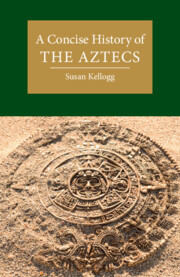Book contents
- A Concise History of the Aztecs
- Cambridge Concise Histories
- A Concise History of the Aztecs
- Copyright page
- Dedication
- Contents
- Figures
- Maps
- Tables
- Preface
- Key Periods and Dates
- 1 Introduction
- 2 Living in the Aztecs’ Cosmos
- 3 Communities, Kingdoms, “Empires”
- 4 Creating Value
- 5 Sex and the Altepetl
- 6 Resilience
- 7 Resilience
- Glossary
- Bibliographic Essay
- Index
7 - Resilience
Part Two: Trauma, Transformation, Tenacity
Published online by Cambridge University Press: 08 February 2024
- A Concise History of the Aztecs
- Cambridge Concise Histories
- A Concise History of the Aztecs
- Copyright page
- Dedication
- Contents
- Figures
- Maps
- Tables
- Preface
- Key Periods and Dates
- 1 Introduction
- 2 Living in the Aztecs’ Cosmos
- 3 Communities, Kingdoms, “Empires”
- 4 Creating Value
- 5 Sex and the Altepetl
- 6 Resilience
- 7 Resilience
- Glossary
- Bibliographic Essay
- Index
Summary
The invasion of Mesoamerica – set off by the arrival of Cortés and his followers – was neither peaceful nor simple. These events played out in three phases between February 10, 1519 when the expedition left Cuba and August 13, 1521 when the Mexica tlatoani, Cuauhtemoc, was captured. During the first phase, Moteuczoma and Spaniards sought to learn about each other. Each used diplomacy, Moteuczoma to repel the Spanish, Cortés to gain indigenous allies, to affect events. The second phase of the Spanish-Mexica war began with the Spanish arrival in Tenochtitlan and their imprisonment of Moteuczoma shortly thereafter. That phase ended with Spaniards forced to retreat after their disastrous assault on the Templo Mayor and slaughter of many Mexica leaders. Re-equipping and solidifying his alliances, Cortés and his fighters succeeded in defeating the Mexica in mid-August, 1521. Many kinds of transformations would follow including extensive depopulation and the introduction of new technologies and religious beliefs. Adjustments by Nahuas followed in social and legal affairs as well as in forms of identity. The idea of “Aztec” has tenaciously survived. It exists in contemporary Nahua communities, as an element of national history and culture in Mexico, and as a transnational idea.
Keywords
- Type
- Chapter
- Information
- A Concise History of the Aztecs , pp. 246 - 284Publisher: Cambridge University PressPrint publication year: 2024

